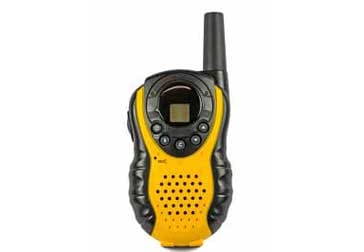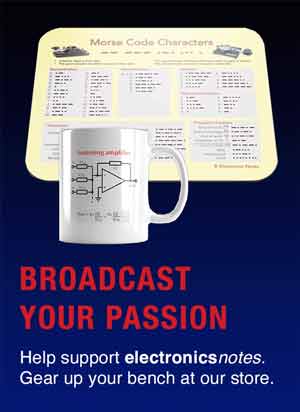Buying a Licence Free Radio- Key Points
Notes and details about some of the points to consider when buying a licence free radio.
Licence free radio systems:
Licence free radio systems
Citizens band, CB
PMR446
FRS Family Radio Service
How to use a licence free radio
Hints & tips on buying licence free radio
When buying a licence free radio or walkie talkie handset, there are a number of points that are worth considering.
Whatever the standard of the licence free radio, be it PMR446, FRS or whatever , there are many common considerations.

Look at requirements before buying
When buying a licence free radio it is always wise to consider the requirements. How often will it be used, how long will it be used for, are there any special requirements for calling, i.e. tone calling and similar features.
It may be that a small and low cost set of walkie talkies may be needed for children to use and play with, or it could be that more serious use is needed.
Many small businesses use the licence-free radio systems that are available in their countries for short range communications on their company premises or in other small locations.
It is worth analysing the requirements carefully and possibly listing them so that the specifications of any candidate licence free radios can be compared to see if they meet the requirements.
Considerations when buying a licence free radio
When buying a licence free radio like a PMR446 radio, an FRS radio or some other type of licence free radio, there are a number points to consider.
Durability: The robustness and durability are also key considerations when buying a licence free radio. There are several elements regarding the durability and robustness to be considered when buying licence free radio.
Shock: In many environments such as use within a building site or many other commercial applications, the radio will be treated harshly. In these environments a very robust radio should be considered.
IP Rating: The IP rating will determine its robustness to water and dust ingress. This needs to be checked, especially if it is to be used outside, and in an area such as a building site.
Overall reliability: It is necessary to assess the overall reliability of the radio, especially if it is to be used in any form of business critical application.
Battery Life: Battery life is a major consideration when buying a licence free radio. When looking at the battery life issue it is necessary to consider the amount of usage it will get. The two main options are AA / AAA cells or a custom Lithium ion battery.
Lithium ion batteries are hold more charge than Nickel Metal Hydride. Also Nickel Metal Hydride batteries lose their charge relatively quickly when not in use, whilst Lithium ion ones are much better. However Lithium ion batteries are more expensive and often come with a charger.
If the licence free radios and hence the batteries are to undergo long periods of use, then lithium ion batteries are normally better. For occasional use when they can be charged beforehand, Nickel Metal Hydride batteries are cheaper. They can also be replaced when their useful life is ended and they are freely available. Also standard non-rechargeable cells could also be used – a useful fallback.
Calling tones: Many radios have facilities for CTCSS or DCS tones which enable a particular user or set of users to be called. Using these tones saves interference and unnecessary activation of the audio.
Price: In many instances price will be an issue. For personal use, the price will be an issue when buying a licence free walkie talkie radio. However it is necessary carefully balance the cost savings against performance, reliability and suitability for the particular application. Also remember that the joy of low cost will be forgotten soon after the pain of poor quality kicks in.
Special features: It is possible that some key features may be required for a particular application. Possibly a tone or vibration for an incoming call. Make sure the radio fully meets the requirements of the application.
Range: Although the range is not a feature of the radio specification because the basic specification of elements like the power output and antenna are defined in the overall specification, it is still worth trying some radios if possible beforehand to see if they work for the particular application. It may be that thick walls or reinforced concrete and distance, or hills make communication difficult or non-existent. It is therefore worth checking before buying.
When buying a licence free radio, it is necessary to carefully look at all the specifications and understand if they meet the requirements. If possible try one out, and certainly try out an equivalent radio in the area where they are to be used, especially if it is within a building. Check that there is not too much screening of the signal.
Checking out the performance before buying a licence free radio will ensure that it meets the requirements fully.
 Written by Ian Poole .
Written by Ian Poole .
Experienced electronics engineer and author.
Wireless & Wired Connectivity Topics:
Mobile Communications basics
2G GSM
3G UMTS
4G LTE
5G
Wi-Fi
Bluetooth
IEEE 802.15.4
DECT cordless phones
Networking fundamentals
What is the Cloud
Ethernet
Serial data
USB
LoRa
VoIP
SDN
NFV
SD-WAN
Return to Wireless & Wired Connectivity




